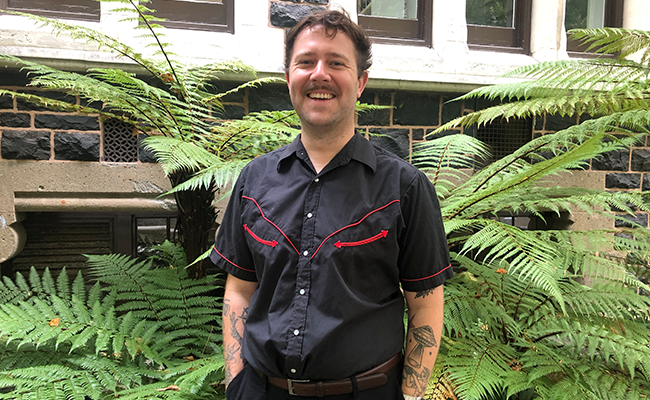
PhD candidate Joshua James hopes to correct some stereotyping and homophobic thinking within political science.
Welcome to the first in our new series 'Introducing postgraduate SGSC', which focuses on postgraduate students within the Sociology, Gender Studies and Criminology Department. In this edition we chat with Joshua James, a PhD candidate researching why queer people support far-right political movements.
Queer people aligning themselves with the far-right* can be doing it out of fear and are, in many cases, committed, quite violently, to national socialism, says Joshua James.
The PhD candidate of the Gender Studies and Politics departments is aiming, through his research, to correct the academic record over some of the stereotyping and homophobic thinking existing within political science.
That the left supported decriminalisation of homosexuality around the world could lead to an assumption that queer people will vote for the left, he says.
But any political allegiance queer people may have had to the left seems to have worn away over the past 40 years.
Certainly, queer people aligning themselves with the far-right is not a new phenomenon.
Ernst Röhm, a leader within the Nazi party, for example, is an historical example of a queer person aligning with the far-right.
“He was an openly gay man, and he didn't see any real tension between his sexual orientation and his belief in national socialism.”
It is from here the term 'gay Nazis' comes, which has contributed to an on-going stereotype, James says.
“All of the academic literature says that gay Nazis are kinksters, they do it for the leather BDSM scene. And my research is trying to reject that and say, actually, queer people can have deeply complicated and nuanced political views. Not everything that queer people do is about sex or kink.”
Many of the handbooks on the far-right mention some well-known gay neo-Nazis, referring to them as 'leather daddies'; “but actually, these are people who committed quite violently to national socialism, above and beyond sex,”, James says.
He wants his research to put the record straight about why some queer peoples' politics are far-right.
“I also think it's great to show that queer people are completely diverse and are allowed to have bad political opinions. We're not a monolith.”
In the contemporary setting his research has found these far-right leaning people feel as though their Western way of life is being challenged, and their liberty is under attack.
In 2013 during the rise of ISIS there was footage live-streamed of ISIS throwing gay men alive off buildings.
“It really drove a lot of not just gay men, but queer people, to the contemporary far-right.”
Mass waves of Syrian immigrants arriving in Germany was also a source of fear, as several gay men had been beaten to death by Syrian refugees, James says.
“[Such behaviour] is driven out of fear. It used to be out of the love for your own race, now it's fear for your place.”
The far right within Aotearoa New Zealand are “considerably more underground” than the far right in Europe or the United States of America.
Action Zealandia, a far-right group within Aotearoa New Zealand, has been classified by academics as a white supremacist organisation, while the group itself claims to promote ethno-nationalism. To be a member, you cannot be a “sexual deviant or immoral pervert”.
“So, you can't be a queer person.”
However, James says he knows of at least two gay men in Aotearoa New Zealand that support the beliefs of Action Zealandia, despite not being able to join. The way the far-right organises itself on the internet makes it harder to geolocate people, so there could likely be more.
James says there is no one queer voice, politically.
Data from Aotearoa New Zealand's 2017 election suggests that ¾ of lesbians voted for the Green Party, while gay male voters were more likely to vote for the National or Labour, but researchers have never dug any deeper into why they hold their views.
“So trying to turn some of these stereotypes on the head is really quite important for me as a researcher.”
*In the context of Joshua's study he uses the term 'radical right', but in general terms 'radical right' and 'far right' can be used interchangeably.
-Kōrero by internal communications advisor, Koren Allpress